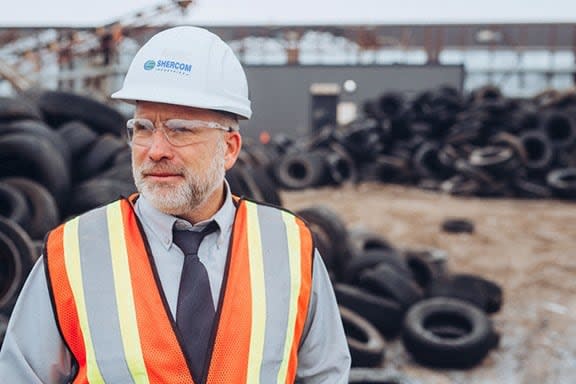
Saskatoon tire dealing with enterprise Shercom Industries has truly educated the Ministry of Labour Relations that it wants to surrender 79 employees members sinceDec 2.
It’s the freshest data after Tire Stewardship of Saskatchewan (TSS), a charitable firm taken care of by the Ministry of Environment, granted authorized rights to reuse tires within the district to California- primarily based enterprise Crumb Rubber Manufacturing.
Shercom Industries acknowledged this has truly offered the united state enterprise a syndicate over Saskatchewan tire recycling and the Saskatoon firm can’t contend, with Crumb Rubber Manufacturing accumulating all scrap tires in Saskatchewan and sending out the merchandise out of district.
That induced Shercom needing to shut down its dealing with plant in May of in 2015. Now, it must import its very personal crumb rubber from exterior the district, which the chief government officer acknowledged leaves a a lot larger carbon influence, to call a couple of downsides.
“Shercom in the same time has had to import 28 million pounds of crumb rubber from B.C., Alberta and Ontario, while all the tires are leaving. The cost to the Saskatchewan economy — with the job losses — is going to be measured in millions of dollars per year on an annual basis for the foreseeable future,” acknowledged Shercom President Shane Olson.
At its peak in 2022, the earlier scrap tire recycler used merely over 140 people, he acknowledged. Now, roughly merely 20 employees members keep.
“It’s a huge cost to the economy, huge cost to the environment and, of course, a huge cost to the community because these people that are laid off, they’re real people,” Olson acknowledged.
“They are real people like you and I with kids, with rent or mortgage, with dreams, with hopes.”


Products generated by Shercom Industries from recycled tires. (Kirk Fraser/ CBC)
Olson acknowledged Crumb Rubber Manufacturing’s syndicate over Saskatchewan tires has truly been a troublesome influence to Shercom, which he has truly seen as extraordinarily efficient and eco conscious.
“Our business model was torpedoed and it was torpedoed by the very province that should have been supporting us,” Olson acknowledged.
The Shercom head of state acknowledged all tire corporations can search for a certificates from the TSS, but Crumb Rubber Manufacturing didn’t.
“Had [they] applied for the license, they would have had to enter Saskatchewan’s marketplace and compete head to head for the tires. Had the TSS just remained administrative, we could have done something amazing together,” acknowledged Olson.
“What they’ve got in exchange is they bought a bag of magic beans that didn’t come with a goose that laid the golden egg. It just came with an ugly giant that has come and destroyed everything that the Saskatchewan people worked so hard to establish in tire recycling.”
Olson acknowledged Shercom leaders are at present trying to reroute the enterprise, which offers with corporations all all through the united state and Canada to arrange rubber paving.
“Shercom is not insignificant. We have a presence across Canada, across North America. It’s because we’re one of the oldest tire recyclers. So there’s options for Shercom.”


Saskatchewan NDP Leader Carla Beck and Saskatchewan Party Leader Scott Moe on the undertaking path all through the 2024 rural political election. (CBC)
On Thursday, Saskatchewan NDP Leader Carla Beck criticized Saskatchewan Party Leader Scott Moe’s federal authorities for top joblessness numbers and making destructive selections for the financial state of affairs.
“This is another instance of Scott Moe focused on his own priorities instead of the priorities of Saskatchewan people. One of those is ensuring we’ve got good jobs in this province,” Beck acknowledged.
She acknowledged the California enterprise should not have truly been granted authorized rights to reuse tires inSaskatchewan She acknowledged these duties should most probably to people in Saskatchewan.
Also on Thursday, Moe acknowledged the district relies upon upon the TSS to make these selections.
“The government’s involvement is setting up that regulatory operational process for those tires to be recycled. And then we rely on an industry appointed board to make the decisions that they do,” Moe acknowledged.
“And we’re always going to have conversations with that industry and we feel they have a requirement to ensure that they have a robust recycling program in place here in the province.”
Both Beck and Olson acknowledged they suppose the agricultural federal authorities can motion in in eventualities like these, but is selecting to not.
